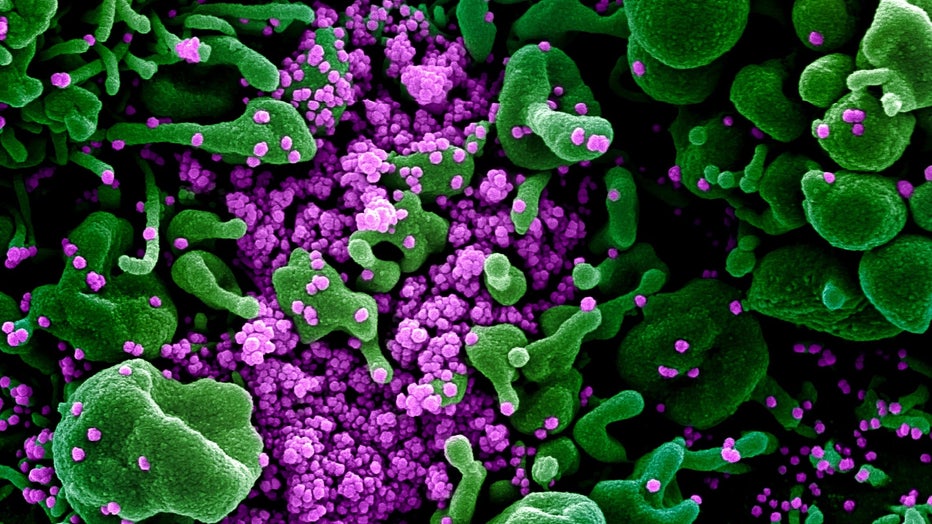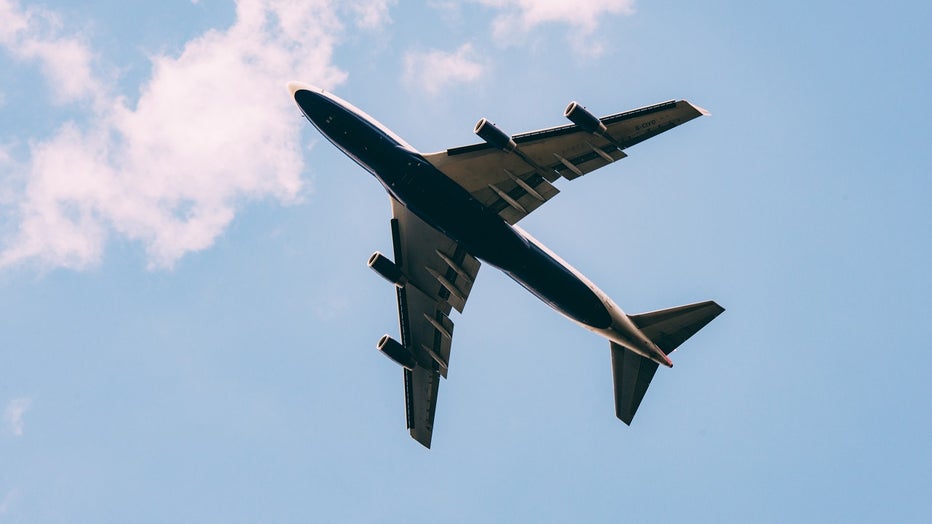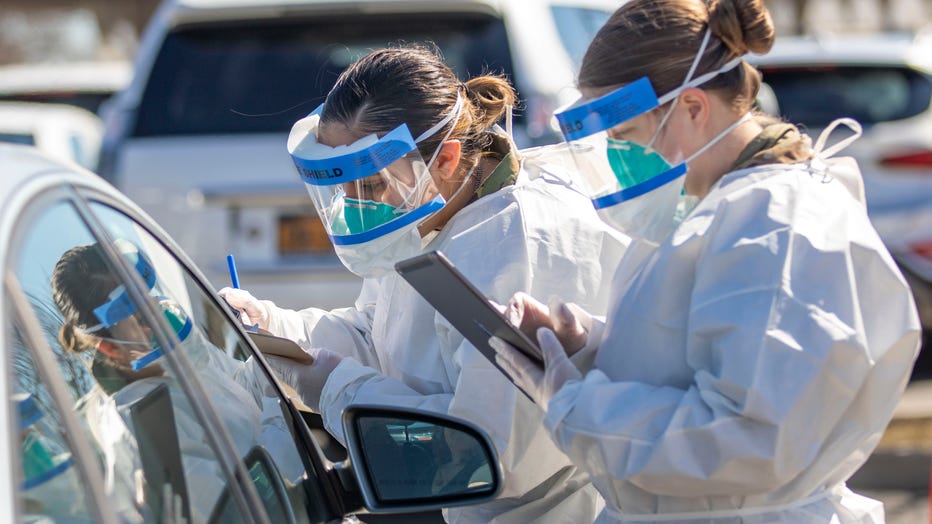What you need to know today about the COVID-19 pandemic

What is coronavirus?
From how it spreads to where it originated, here's a look at everything you need to know about the deadly contagion.
PHILADELPHIA - The death toll from the global coronavirus pandemic has surpassed 13,000 people worldwide and sickened more than 292,000.
FULL COVERAGE: CORONAVIRUS
Here are some of key takeaways on the world’s coronavirus pandemic.
WHAT’S HAPPENING TODAY
— Negotiators from Congress and the White House were holding talks on crafting a $1 trillion-plus economic rescue package. The sweeping aid package of paychecks for suddenly jobless Americans, money for hospitals and aid to industry is all but certain to swell far beyond the initial $1 trillion price tag. Combined with other actions by the Federal Reserve, it could pump $2 trillion into the economy, officials say.
— The Tokyo Olympics have reached a critical phase. Japanese organizers and IOC President Thomas Bach say the games will open July 24 at the $1.4 billion national stadium in Tokyo. But athletes are complaining: They can’t train, qualifying events have been canceled and the chaos is sure to favor some over others. Giant questions remain about bringing 11,000 athletes from 200 countries together in four months. Bach has said repeatedly it’s too early to announce a final decision.
— Africa’s cases of the coronavirus rose above 1,000 on Saturday. Angola announced its first cases, meaning at least 40 of Africa’s 54 countries are now affected. Congo reported its first death and Burkina Faso reported two new ones — that country now has the most virus deaths of any country in sub-Saharan Africa. The West African nation also has one of the highest caseloads on the continent with 64. Somalia said it’s lifting its ban on international flights for two days so stranded citizens can come home. Angola closed its air, land and sea borders this week. Botswana has suspended international travel by all government employees.
— In London, tourist sites were eerily empty a day after the government ordered the closure of all bars, restaurants, movie theaters and other places where people congregate. Pigeons outnumbered people in the usually bustling Trafalgar Square and Leicester Square. There were long lines outside some supermarkets. Prime Minister Boris Johnson is meeting with supermarket executives over the weekend about how to keep the shelves filled.
— In the U.S., at least 13 states have postponed voting and more delays are possible as health officials warn that social distancing and other measures to contain the virus might be in place for weeks, if not months. Primaries scheduled for Georgia, Ohio, Maryland, Indiana, Louisiana, Connecticut and Kentucky have all been postponed to May or June.
— Vice President Mike Pence and his wife, Karen, have tested negative for the coronavirus. The vice president’s press secretary, Katie Miller, tweeted the results of the tests Saturday night. Pence had announced earlier Saturday that, out of an abundance of caution, he and his wife, Karen, would be tested for the virus. A member of the vice president’s staff had tested positive for the virus.
RELATED COVERAGE:
Social distancing: What to do and what not to do to slow the spread of COVID-19
Interactive map tracks spread of COVID-19 globally
WHO: Type of cough may differentiate coronavirus from cold
Trump signs coronavirus relief package; Congress eyes larger economic stimulus

Colorized scanning electron micrograph of an apoptotic cell (green) heavily infected with the SARS-COV-2 virus particles (purple), isolated from a patient sample. (National Institute of Allergy and Infectious Diseases, NIH)
— New York is desperately searching for medical supplies and scouting field hospital locations in New York City and its suburbs. Gov. Andrew Cuomo confirms that the state has more than 10,000 coronavirus cases. Flights to New York City-area airports and to Philadelphia were briefly suspended because of staffing issues.
— Outbreaks of the new coronavirus at nursing homes in Washington, Illinois, New Jersey and elsewhere in the U.S. are laying bare the industry’s long-running problems. The deadliest single spot in the U.S. outbreak so far is the Life Care Center in the Seattle suburb of Kirkland. Federal investigators believe working conditions - including understaffing and low pay - have been a contributing factor in the 35 deaths to date.
— Spain now has the third-highest number of infections worldwide. On Saturday it reported almost 5,000 new cases in the past day, bringing the total to nearly 25,000. The death toll rose to 1,326, up from 1,002 Friday. Spanish health authorities have acknowledged that some intensive care units in the hardest-hit areas are close to their limit, and warned that they expect infections to continue to rise before measures to reverse the trend have an effect.
— The Palestinian Health Ministry has announced the first two cases of the coronavirus in the Gaza Strip. The ministry said early Sunday that the cases were for two people who returned recently from Pakistan. The discovery increases fears of a potential outbreak in the crowded enclave, amid an overstretched health care system that struggles under years of an Israeli-Egyptian blockade and Palestinian political division.
— The Chinese city of Wuhan, where the global pandemic was first detected, went a fourth consecutive day on Sunday without reporting any new or suspected cases of the virus. Elsewhere, the country reported 46 new cases over the previous 24 hours, 45 of them coming from overseas. Another six deaths were also reported, four in Wuhan, one in the surrounding province of Hubei and one elsewhere. China has recorded a total of 81,054 cases and 3,261 deaths
The number of coronavirus cases and deaths continues to climb. The map above illustrates where confirmed cases of the COVID-19 virus exist across the world.
See mobile version here.
___
WHAT YOU NEED TO KNOW
For most people, the virus causes only mild or moderate symptoms, such as fever and cough. For some, especially older adults and people with existing health problems, it can cause more severe illness, including pneumonia. The vast majority of people recover.
Here are the symptoms of the virus compared with the common flu.
One of the best ways to prevent spread of the virus is washing your hands with soap and water. The U.S. Centers for Disease Control and Prevention recommends first washing with warm or cold water and then lathering soap for 20 seconds to get it on the backs of hands, between fingers and under fingernails before rinsing off.
You should wash your phone, too. Here’s how.

(Photo by Jordan Sanchez/Unsplash)
ONE NUMBER
MORE THAN 220,000: Acting U.S. Homeland Security Secretary Chad Wolf says this is the number of Americans who have been screened at airports while returning to the United States from coronavirus-affected countries. Americans returning from virus-affected regions have been routed to one of 13 major airports. Many of them have posted on social media of long waits and crowded conditions with hundreds of people crammed together for hours in packed lines. Some also noted that medical personnel didn’t even check to see if they had a fever before letting them into the country. Wolf told “Fox and Friends” on Saturday that medical personnel are, in some cases, simply eyeballing individuals to weed out those who seem obviously ill.

(U.S. Army National Guard photo by Sgt. Amouris Coss)
IN OTHER NEWS
CHINA SENDS AID: China is supplying millions of masks and other desperately needed items to struggling governments, hoping to build political ties and defuse criticism that it allowed the disease to spread early on.
___
For the latest local news, sports and weather, download the FOX 29 News app.
DOWNLOAD: FOX 29 NEWS APP
___
The Associated Press contributed to this report.

